SALT LAKE CITY - Jewish leaders in a dispute with The Church of Jesus Christ of Latter-day Saints over the practice of posthumous baptisms say there is new evidence that names of Jewish Holocaust victims continue to show up in the church's vast genealogical database.
"We've been dealing with it for 11 years, since 1995, and we continue to deal with it," said Ernest Michel, a Holocaust survivor and founding member of the American Gathering of Jewish Holocaust Survivors.
Posthumous baptism is a sacred rite practiced in Mormon church temples for the purpose of offering membership in the church to the deceased. Church members are encouraged to conduct family genealogy research and forward their ancestors' names for proxy baptism.
Church President Gordon B. Hinckley has said the baptismal rite is only an offer of membership that can be rejected in the afterlife by individuals. "So, there's no injury done to anybody," Hinckley told the AP in an interview last November.
But Jews are offended by the practice and in 1995 signed an agreement with Mormon leaders aimed at preventing the names of Holocaust victims from being added to the genealogical index. The agreement would also have limited entries of other Jewish names to those persons who are direct ancestors of current Mormons.
A cross-referencing of more than 1,500 Dutch Jews whose names should have been deleted from the church's International Genealogical Index remain in the database, Michel said.
Over the past three months, the entries were matched by Salt Lake City researcher Helen Radkey against a 1995 list of deleted names provided by church leaders to Michel's organization.
Michel, whose parents were posthumously baptized, said Wednesday that he is in talks with church leaders and is working on a July meeting date to discuss the latest findings.
Mormon church spokesman Mike Otterson said Friday that no meeting had been scheduled, but that Michel has been encouraged to bring his concerns before a working group of church staff and Jews set up in April 2005 to continue to work out database issues.
"One of the benefits of previous meetings is that we established an ongoing joint working group that would address what would appear to be any anomalies, or anything that appears to be slipping through our screening process," Otterson said. "That committee continues to meet and continues to be the best place for addressing these concerns."
___
Defending the Historic Evangelical Christian Faith in our postmodern and post-Christian times for the glory of Almighty God and the salvation of all peoples. We believe in the Trinity, the authority of the Bible alone, salvation is by grace alone through faith alone in Jesus Christ alone, based on the Bible alone for the glory of Almighty God alone, amen. Evangelical Debate Society Website: http://www.evdebate.com/
The Evangelical Debate Society

About Me
- The Evangelical Debate Society
- Lee Edward Enochs Chairman, The Evangelical Debate Society We are a Conservative, Bible based and Christ centered Evangelical Apologetics ministry dedicated to the defense of Evangelical Christianity and the promotion of the Gospel of Jesus Christ. We believe in the absolute and exclusive authority, inerrancy, infallibility and inspiration of the Bible in every respect and in all its parts. We believe the Bible is our only authority in all matters pertaining to Christian faith and practice including Christian Apologetics and debating. We believe in the doctrine of the Trinity, the full Deity of Jesus Christ, His virgin birth, sinless life and substitutionary atonement on the Cross of Calvary. We believe in the Protestant Reformation doctrine of justification by grace alone through faith alone in Jesus Christ alone based on the exclusive authority of the Bible alone all for the glory of God. We defend the Evangelical Christian faith likewise, all for the glory of God and believe that all men and women should repent of their sins and place their faith in Jesus Christ.